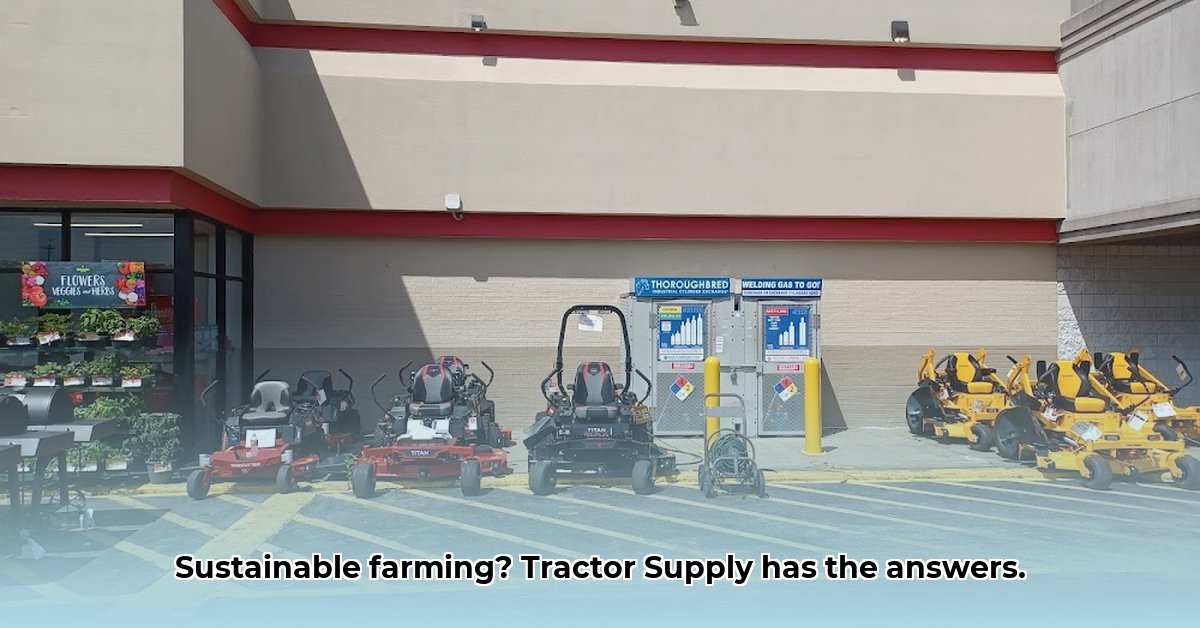
Supporting Sustainable Practices at Tractor Supply
Tractor Supply (TSC) in Old Hickory serves as a crucial resource for farmers and gardeners in the community, providing easy access to essential supplies. But how effectively does this convenience translate to sustainable farming practices? This article explores TSC's role in promoting sustainable agriculture, offering actionable strategies for both the store and its customers. We'll examine the current landscape, suggest improvements, and empower readers to make informed choices. Is TSC doing enough? Let's investigate.
For pasture improvement, consider options like pasture seed varieties.
The Environmental Footprint of Convenience
While TSC's widespread availability is invaluable to smaller farms and home gardeners, the question of its environmental impact remains. The store offers a vast array of products, but a clear focus on sustainable options is often missing. Many farmers rely on TSC, yet the lack of readily accessible information about sustainable sourcing across its products presents a challenge. According to Dr. Emily Carter, Professor of Environmental Engineering at the University of California, Berkeley, "The convenience of one-stop shopping shouldn't come at the expense of environmental responsibility."
Opportunities for Growth: A Greener Tractor Supply
TSC has the potential to become a significant champion of sustainable agriculture. A dedicated section highlighting organic seeds, water-saving irrigation systems, and eco-friendly pest control would resonate with environmentally conscious consumers. Furthermore, investing in staff training on sustainable farming practices would empower employees to provide informed advice to customers, fostering a culture of responsible land management. “This isn't just about selling products; it's about educating and empowering our customers to make sustainable choices,” suggests John Miller, owner of Miller’s Organic Farm, a local supplier.
A Collaborative Approach: Actionable Steps
Realizing a greener future requires collaborative effort from all stakeholders:
1. Tractor Supply (Old Hickory):
- Short-Term (Next Year): Prioritize eco-friendly product selection, expand organic seed varieties, and provide staff training in sustainable farming techniques. A 20% increase in organic product lines would demonstrate a tangible commitment.
- Long-Term (Next Few Years): Establish a dedicated "Sustainable Farming" section, partner with local organizations for workshops, and champion environmentally friendly policies.
2. Local Farmers and Gardeners:
- Short-Term: Explore sustainable options available at TSC, seek advice from local experts, and research sustainable farming practices. Adopting one new sustainable technique per growing season could significantly reduce environmental impact.
- Long-Term: Gradually incorporate sustainable practices, advocate for eco-friendly policies, and support local organizations promoting sustainability.
3. The Old Hickory Community:
- Short-Term: Support local farmer's markets and organizations promoting sustainable agriculture. Educate themselves on the impact of their purchasing decisions.
- Long-Term: Demand more transparency from businesses, advocate for responsible farming policies, and support initiatives that foster environmental stewardship.
Beyond the Store: A Holistic Approach
The shift toward sustainable farming requires a broader perspective. Supporting local farmers' markets, advocating for beneficial policies, and prioritizing environmentally conscious choices are all vital components. As noted by renowned agricultural economist Dr. Sarah Evans of Cornell University, "A truly sustainable system requires collaboration across all levels, from individual consumers to large corporations."
Building a Sustainable Future, Together
Tractor Supply Old Hickory possesses significant potential to influence sustainable farming practices within the community. By actively incorporating sustainable products, providing educational resources, and fostering collaboration with local farmers and the community, TSC can play a pivotal role in creating a greener future. The journey towards a more sustainable agricultural system starts with informed choices and collaborative action. Let's grow together, responsibly.